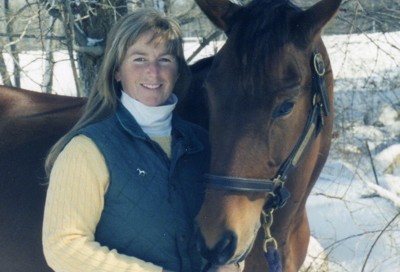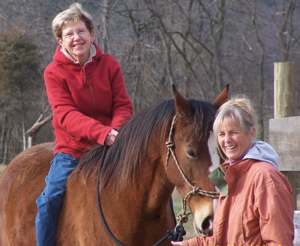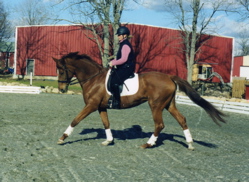 Although I didn’t start riding until I was in my late 20’s it quickly became an all consuming passion. Since I’d begun my riding lessons at a hunter/jumper barn I assumed that I’d continue down that path when I purchased my first horse, a Thoroughbred who had been raced and then retrained for hunters. All that was until I discovered dressage and I knew that was the direction my life would take.
Although I didn’t start riding until I was in my late 20’s it quickly became an all consuming passion. Since I’d begun my riding lessons at a hunter/jumper barn I assumed that I’d continue down that path when I purchased my first horse, a Thoroughbred who had been raced and then retrained for hunters. All that was until I discovered dressage and I knew that was the direction my life would take.
Two years into my riding career I started riding with a dressage trainer who had competed at Grand Prix and I was inspired to want to excel as a rider. A few years later, I would sell the TB and buy a 4 year old mare – an Anglo-Trakehner named Tulsa as a dressage prospect.
It didn’t take long to discover that Tulsa was going to prove to be a real challenge. Although temperamentally she was very sweet and never did anything dangerous, she was quite adamant about resisting my efforts to progress her training. The obvious answer was that I simply didn’t ride well enough which is why I was inspired to work really hard at improving my riding skills. And, I did improve. But while other horses gave me a thumbs up, Tulsa was not impressed. And, when my teachers rode the mare, they too were perplexed. Tulsa was definitely wasn’t going by the book.
At this point, you may be wondering, Why keep the horse? The answer is complicated. In part, it was financial. I knew that any horse I could afford would not be ideal. Plus, it didn’t feel right to cast her off simply because she wasn’t turning out to be everything I’d hoped for. And finally, she was like a puzzle that I was addicted to figuring out. So I was in it for the long haul.
As it happened, it was early on in my relationship with Tulsa that I first heard of the thing called clicker training from a friend who had just gotten a new puppy. It took about a year of training my dogs for me to realize that what I was learning about clicker training applied to horses, too. Simultaneously, I was getting exposed to a variety of points of view about horsemanship and riding, as well, like German vs. French and dressage vs. natural horsemanship. Tulsa, was in a sense, a guinea pig. Maybe knowing there was nothing to lose made it easier to forge my own path? Anyway, over the years I learned a lot from Tulsa which I have able to bring to numerous other horses. What I found was that while some are more easy going in nature than others, they all appreciate being trained like a sensitive mare.
My studies have given me a clear direction in terms of not only my long term goals (balance, suppleness, freely forward) but also a sense of where to start (horsemanship) as well as a means to get there (reinforcement). And that whole thing together is what “Getting to Yes” is about.
Intrigued? Got a horse who’s got you baffled? Contact me! Email me: sharon @ horsemansarts.com .
Other Sensitive Mares – click the images to read their stories.


